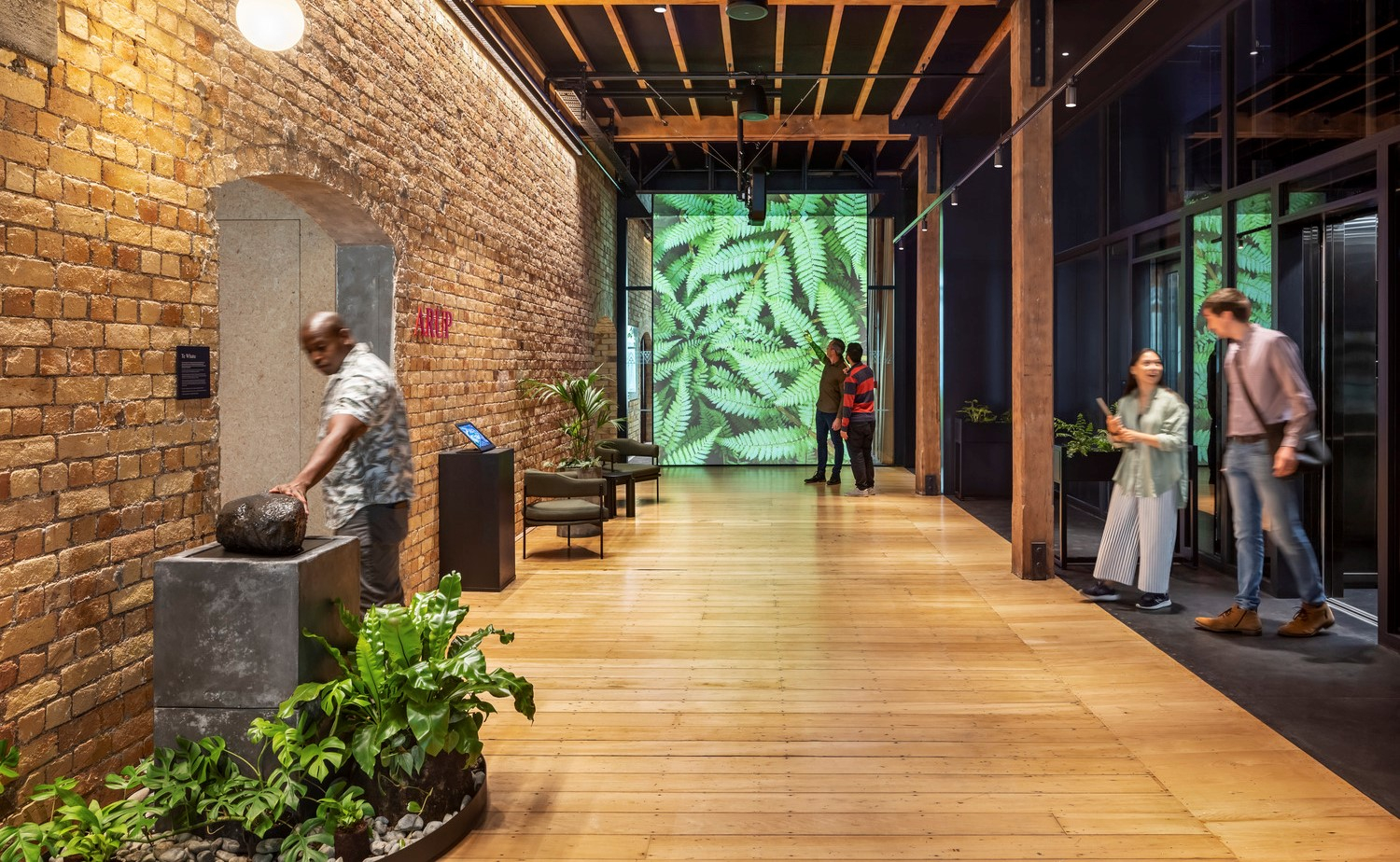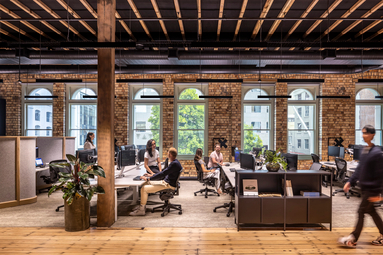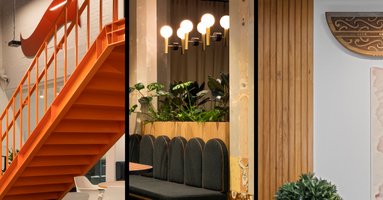Unispace applies 'Living Building Challenge' standards for sustainable office design at Arup, a global engineering firm.

In partnership with design-build firm, Unispace, Arup's new Auckland, New Zealand space highlights leadership in energy and environmental design and storytelling.
Auckland, New Zealand, September 20, 2023 - Unispace, a global workplace strategy, design and construction leader has completed Arup's 6,500 square foot office space in Auckland, New Zealand. Arup is a global engineering consultancy that provides design, advisory and technical services across every aspect of the built environment.
The firm challenged Unispace to create a sustainable office design, and net positive space that reflects Arup's purpose to deliver tangible social good and enables employees to do their best work. On the latter, post-occupancy evaluation data pegs average employee utilization at 95%. While the office was designed with a hybrid work style in mind, Arup is working with Unispace to extend into the sub-tenancy area on the same floor because of the popularity of the space with employees.
Meeting stringent net positive sustainable commercial design requirements
As a first step, Unispace professionals worked with Arup to assess all existing sustainability accreditations and determined that the Living Building Challenge (LBC) standards, a certification process to measure regenerative practices, best aligned with Arup's values and aspirations. To date, there are no global interior fit-out projects that are LBC certified. Arup expects to be one of the first globally - and the first in New Zealand - when they complete the LBC's audit requirements.
"Arup's mission is to pioneer new ways to shape a better world, and we felt that the Living Building Challenge standards' innovative and rigorous approach to sustainability fit within this worldview," said Darcy Utting, Principal, Design, Unispace. "Unispace and Arup were determined to push the boundaries and set the benchmark to create an office space that leaves a net positive carbon impact."
Every aspect of the project was considered for its role in reducing the office's carbon impact. In a striking example, the flooring protection, which is typically trashed after a single-use, was rolled-up and reused on other construction sites; the kitchen benchtop is comprised of approximately 5,000 pieces of plastic waste. Other sustainable building design practices from the project include:
- Landfill avoidance: diversion of 99% of waste from landfill.
- Responsible material curation: 90% of materials used in the construction process are free of toxic ingredients.
- Local sourcing: 50% of materials were sourced locally.
- Energy and water efficiency: the space uses 35% less power and 30% less water than an equivalent building.
- Access to natural light: 95% of workstations are within 45 feet of windows to provide access to natural light and views in recognition of human's innate connection to nature.
- Mindful furniture selection: furniture was reused whenever possible and when something new was needed, it was locally sourced to maintain a low carbon footprint.
Enabling an inclusive environment - connecting a global brand to the local culture and its heritage
On the design front, Arup's Auckland workplace sought a connection to its global offices while weaving in a uniquely New Zealand identity. Local Māori, New Zealand's indigenous people, were involved from the outset and consulted throughout all stages of design as the tāngata whenua (people of the land). This began with a cultural engagement framework and continued across several co-design workshops exploring narrative, journey, plantscape decisions, artwork and room naming conventions. It was important to Arup that the Māori perspective was meaningfully felt, seen and heard within the built environment. For example:
- Materials and greenery: Punga logs, reclaimed Kauri timber, river stones and native planting were biophilic elements that weaved together Arup's values with the Māori worldview to share the story of this place and its people.
- Spiritual connection to space: the flow of the space represents a journey from the mountains (Maungawhau) to the sea (Waitematā). The concept is a co-creation with Ngāti Whātua Ōrākei (local Māori tribe) - creating a spiritual connection between the history of place and a regenerative future.
- Emotional, physical and spiritual well-being: supporting the journey concept is a zoning approach anchored by the three hearts (baskets of knowledge): Pūmanawa: emotional body - arrival experience, Mānawa: physical body - Hui collaboration space, Whatumana: spiritual body - retreat for thinking, calm, recharge.
- Original artwork: There are three layers of artwork - digital, wayfinding graphics and glazing manifestation. Physical artwork was commissioned through cultural advisor and created for Arup by local iwi, Ngāti Whātua Ōrākei.
- Diversity, equity, inclusion and belonging (DEIB): Unispace partners with Amotai in New Zealand to ensure at least 5% of all sub-contractors are from Māori or Pasifika background, ensuring we maintain supplier diversity across all projects and provide equal access to opportunities.
"We sought to create a space that reflects our people and values - a place that current and future talent can identify with and feel proud of," said Mayurie Gunatilaka, New Zealand Leader at Arup. "Based on employee uptake, we've been able to prove that a thoughtful, sustainable, and people-centric design is a powerful return-to-office motivator. Arup is adopting this workplace approach as part of our workplace strategy to differentiate the firm within the market, to attract and retain talent."
"The Living Building Challenge standards aim to leave a net positive impact on the environment which aligns perfectly with the Māori worldview. Centered on restoring, sustaining and caring for the environment, it is our responsibility to nurture, learn from and respect the land. Designing to Living Building Challenge standards enabled the creation of a space that enabled us to tell this story and share our beliefs," Mayurie added.
"A takeaway for us for future projects is that the Living Building Challenge standards are a conduit to explore clients' values and beliefs, which gives us a blueprint for uncovering their unique identity and in turn, infusing it throughout the space." said Darcy. Adding, "Applying Living Building Challenge standards requires a deep commitment to and understanding of sustainable building design and responsible construction practices. While not all clients will pursue Living Building Challenge accreditation, we'll be applying this new-found knowledge to support their sustainability goals in future projects."
Read Arup's full project story here.
Read about Arup's workplace in:
Work Design Magazine Office Tour
CoreNet Global's "The Pulse" blog
About Unispace
A leader in design-build creating experiences for a rapidly changing world. Unispace is a global firm that offers a unified team solution for creating people-centric spaces with purpose - including offices, laboratories and life sciences facilities, campuses, HQ's, hospitality and sports venues and retail spaces that spark brilliance, deepen connections, foster a sense of belonging and propel success. With 5,500 projects completed, a presence across 26 countries, and 700+ employees worldwide, our goal is to create spaces that spark brilliance for the people who use them - powered by collaborative client partnerships, delivered seamlessly across borders and enabled by real-world insights.
About Arup
Dedicated to sustainable development, Arup is a collective of designers, consultants and experts working globally. Founded to be humane and excellent, we collaborate with our clients and partners using imagination, technology and rigor to shape a better world.
As an independent firm, with a trust structure, Arup has no external investors. The Australasia Region encompasses Australia, New Zealand, Singapore, Indonesia and Malaysia, with a 3000-strong team providing consultancy services to government, corporate and community-based clients.


